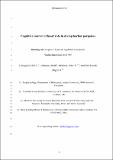Files in this item
Cognitive control of heart rate in diving harbor porpoises
Item metadata
| dc.contributor.author | Elmegaard, Siri | |
| dc.contributor.author | Johnson, Mark | |
| dc.contributor.author | Madsen, Peter | |
| dc.contributor.author | McDonald, Birgitte | |
| dc.date.accessioned | 2017-11-22T00:33:12Z | |
| dc.date.available | 2017-11-22T00:33:12Z | |
| dc.date.issued | 2016-11-21 | |
| dc.identifier | 248203964 | |
| dc.identifier | 4b4e57c4-d9ea-4db4-98a7-72fb33102077 | |
| dc.identifier | 84997124353 | |
| dc.identifier | 000388545900005 | |
| dc.identifier.citation | Elmegaard , S , Johnson , M , Madsen , P & McDonald , B 2016 , ' Cognitive control of heart rate in diving harbor porpoises ' , Current Biology , vol. 26 , no. 22 , pp. R1175-R1176 . https://doi.org/10.1016/j.cub.2016.10.020 | en |
| dc.identifier.issn | 0960-9822 | |
| dc.identifier.uri | https://hdl.handle.net/10023/12145 | |
| dc.description | M.J. was funded by the Marine Alliance for Science and Technology, Scotland, and by a Marie Curie Career Integration Grant. | en |
| dc.description.abstract | Marine mammals have adapted to forage while holding their breath in a suite of aquatic habitats from shallow rivers to deep oceans. The key to tolerate such extensive apnea is the dive response, which comprises bradycardia and peripheral vasoconstriction. Although initially considered an all-or-nothing reflex [1] , numerous studies on freely diving marine mammals have revealed substantial dynamics of the dive response to meet the impending dive demands of depth, duration and exercise [2] . Such adjustments are not only autonomic responses, but are under acute cognitive control in pinnipeds [3] living amphibiously on land and in water. The fully aquatic cetaceans would similarly benefit from cognitive cardiovascular control; however, even though they have exercise-modulated diving bradycardia [2] and full voluntary control of their respiratory system to such extent that even mild anesthesia often leads to asphyxiation [4] , cognitive cardiovascular control has never been demonstrated for this large group of marine mammals. To address this, we tested the hypothesis that porpoises modulate bradycardia according to anticipated dive duration. Two harbor porpoises, instrumented with ECG recording tags, were trained to perform 20- and 80-second stationary dives, during which they adjusted bradycardia to the anticipated duration, demonstrating cognitive control of their dive response. | |
| dc.format.extent | 2 | |
| dc.format.extent | 154901 | |
| dc.language.iso | eng | |
| dc.relation.ispartof | Current Biology | en |
| dc.subject | QH301 Biology | en |
| dc.subject | QL Zoology | en |
| dc.subject | QP Physiology | en |
| dc.subject | NDAS | en |
| dc.subject | BDC | en |
| dc.subject | R2C | en |
| dc.subject | SDG 14 - Life Below Water | en |
| dc.subject.lcc | QH301 | en |
| dc.subject.lcc | QL | en |
| dc.subject.lcc | QP | en |
| dc.title | Cognitive control of heart rate in diving harbor porpoises | en |
| dc.type | Journal article | en |
| dc.contributor.sponsor | European Commission | en |
| dc.contributor.institution | University of St Andrews. School of Biology | en |
| dc.contributor.institution | University of St Andrews. Marine Alliance for Science & Technology Scotland | en |
| dc.contributor.institution | University of St Andrews. Sea Mammal Research Unit | en |
| dc.contributor.institution | University of St Andrews. Sound Tags Group | en |
| dc.contributor.institution | University of St Andrews. Bioacoustics group | en |
| dc.contributor.institution | University of St Andrews. Scottish Oceans Institute | en |
| dc.identifier.doi | https://doi.org/10.1016/j.cub.2016.10.020 | |
| dc.description.status | Peer reviewed | en |
| dc.date.embargoedUntil | 2017-11-21 | |
| dc.identifier.grantnumber | PCIG10-GA-2011-304132 | en |
This item appears in the following Collection(s)
Items in the St Andrews Research Repository are protected by copyright, with all rights reserved, unless otherwise indicated.

